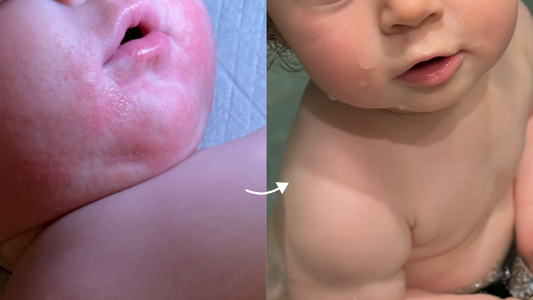The eczema-gut connection: Why we need to look deeper than the skin
Written by: Alba Health team
Last updated: 2025-10-23

Summary
Eczema affects up to one in five children – and for many families, it’s a constant cycle of flare-ups, creams, and sleepless nights. But science now shows that eczema is not just a skin condition: it’s an immune condition with roots in the gut. In this article, we explore the emerging science of the gut-skin axis and what it means for parents and adults navigating eczema. You’ll learn why the gut microbiome plays a key role in inflammation and how small, practical steps can help you support skin health from within.
For millions of parents and adults, the experience with eczema is a frustrating cycle of creams, confusion, and sleepless nights. You see the red, itchy skin on your child – or feel it on your own – and are often told to apply a new topical steroid, which may only quiet the symptoms for a short time.
This is a story we hear constantly from families. It’s a feeling of helplessness as you try everything, only for the eczema flare-ups to return. But a growing body of research shows that for many, eczema (or atopic dermatitis) is not just a skin condition. It’s an immune condition. And the key to understanding it may not be on the skin, but deep within the gut microbiome. This is the eczema-gut connection.
This is educational content, not medical advice. Always consult your healthcare provider for diagnosis and treatment.
Eczema as a systemic issue: Background and context
Eczema, or atopic dermatitis, is one of the most common inflammatory skin conditions, affecting up to 20% of children and a significant number of adults worldwide. For too long, it has been misunderstood as just a "cosmetic rash".
The primary treatment for decades has been topical steroids. While these creams can be essential for managing the symptoms of acute flares, they don't address the underlying inflammation. As many parents and adults know, this can feel like a temporary fix. This approach often "masks the symptoms" without getting to the root cause of the eczema.
How the system works: The gut-skin axis connection
The reason treating the skin alone often isn't enough is because of a powerful communication system known as the gut-skin axis. This is the two-way relationship between our gut microbiome and our skin health.
The immune system's role
Eczema is not just skin-deep: it is an inflammatory condition mediated by the immune system. An "overreaction" of the immune system leads to the inflammation that shows up on the skin.
The gut microbiome's role in inflammation
So, where is the immune system "trained"? A primary location is the gut. The gut microbiome – the community of trillions of bacteria in our gut – is in constant communication with our immune cells, helping to teach them what to attack and what to ignore .
This is where the connection becomes clear. Research increasingly shows that in children and adults with eczema, this gut community can be out of balance. Key protective bacteria, such as Bifidobacterium and Lactobacillus, are often found in lower levels. This imbalance, or "dysbiosis," can mean the immune system doesn't get the right training, leading to a state of chronic, low-grade inflammation that can contribute to skin conditions like eczema.

What’s changed: From topical creams to root causes
Then: A skin-only approach. The standard approach focused almost exclusively on the skin. The goal was to manage the external rash with anti-inflammatory creams (topical steroids) and heavy moisturizers to "seal" the skin barrier.
Now: A systemic, microbiome-aware approach. Today, we understand eczema is a complex condition. While new biologic and oral therapies are available for severe cases, the science is also pointing to a more fundamental, proactive approach: supporting the gut to find the underlying cause of the eczema.
Landmark studies are driving this shift. The Finnish HELMi study and the Canadian CHILD study are two examples that have shown how the composition of a child's gut microbiome in the first year of life can predict the risk of developing eczema and allergies. This tells us the foundation for eczema is often laid long before the first rash appears, and it starts in the gut.
The hidden impact of eczema (more than a rash)
This distinction is important because it validates the feelings of so many families. As Korey Capozza, founder of Global Parents for Eczema Research, shared on our podcast, the true impact of eczema is often invisible.
It’s the unbearable itch that distracts a child from playing or even eating. It’s the sleepless nights
for the entire family. It's the stress, anxiety, and decision fatigue that comes from trying everything-changing detergents, trying elimination diets-and still not knowing the eczema triggers. It's a heavy psychosocial burden that goes far beyond a "cosmetic" issue.
What you can do (supporting the gut-skin connection)
While there is no "cure" for eczema, this new understanding gives us practical, safe, and proactive ways to support the body. This is educational content, not medical advice; always speak with your doctor or a pediatric dermatologist about your specific situation.
1. Support the gut microbiome with nutrition
Since the gut microbiome is so central, nutrition is a key lever. Focus on a whole-foods diet rich in fiber (prebiotics) to feed beneficial bacteria. Reducing highly processed foods, which often contain emulsifiers and preservatives, may help support the gut barrier.
2. Protect the skin barrier (topical care)
Gentle skincare remains crucial. Avoid harsh soaps or cleansers (like those with sodium lauryl sulfate) that can strip the skin barrier. Use lukewarm water for baths, and apply a high-quality moisturizer-preferably from a pump, not a tube, to avoid contamination-on damp skin.
3. Test, don't guess: Understand your unique microbiome
For many, the biggest frustration is not knowing why the eczema is flaring. Is it diet? Is it stress? Or could it be the gut? This is where getting clear data can help you stop guessing. Alba Health's at-home test helps you understand this gut-skin connection by analyzing your or your child's gut microbiome. Our report identifies key patterns, such as low levels of beneficial bacteria like Bifidobacterium and Lactobacillus that are scientifically linked to immune health and eczema risk.
This information gives you a path forward. If significant imbalances are detected, you get a clear, science-backed plan. If the gut microbiome looks balanced and mature, you can more confidently rule it out as a primary factor and focus your energy on other potential triggers with your healthcare provider. It’s about getting the right information to take the right next steps.
Summary
- Eczema (atopic dermatitis) is not just a skin condition; it is a complex inflammatory condition mediated by the immune system.
- The gut-skin axis is the critical communication pathway between the gut microbiome and skin health.
- Imbalances in the gut, such as low levels of Bifidobacterium and Lactobacillus, are linked to a higher risk of eczema.
- Conventional treatments like steroid creams often manage symptoms without addressing the potential eczema root cause.
- The lived experience of eczema involves a significant, often invisible, psychosocial burden from triggers and sleepless nights.
- A proactive approach includes supporting the gut through nutrition, protecting the skin barrier, and getting clear data to understand your unique microbiome.
- Wiertsema SP et al. 2021. The interplay between gut microbiome, diet and immunity. Nutrients.
- Lee SY et al. 2018. Microbiome and allergic diseases: From epigenetics to therapy. Allergy Asthma Immunol Res.
- Pascal M et al. 2018. Microbiome and allergic diseases: Beyond the gut. Allergy.
- Penders J et al. 2013. The intestinal microbiota and its role in allergic diseases. J Allergy Clin Immunol.
- Haahtela T et al. 2021. Microbial diversity and the hygiene hypothesis revisited. Nat Rev Immunol.
- Milani C et al. 2017. The first 1000 days: shaping the infant gut microbiome. Front Microbiol.
- Bridgman SL et al. 2016. Infant gut immunity and eczema risk: Findings from the Canadian CHILD study. Allergy Asthma Clin Immunol.
- Laursen MF et al. 2021. Infant gut microbiota development and the risk of allergic disease. Nat Commun.
- Parada Venegas D et al. 2019. Short-chain fatty acids mediate the connection between diet, gut microbiota, and immune function. Front Immunol.
- Deehan EC, Walter J. 2016. The role of gut microbes in metabolic and immune health. Trends Endocrinol Metab.
- Egert M et al. 2022. The gut-skin axis: How the microbiome influences skin health. Exp Dermatol.
- Fyhrquist N et al. 2019. Microbiota in atopic dermatitis and its impact on skin inflammation. Clin Exp Immunol.
Curious how your child’s gut health may affect their eczema?
Discover your child’s gut health with Alba’s pioneering test – and get expert, personalized guidance from a certified Nutrition & Health Coach to help it thrive.
Get started


